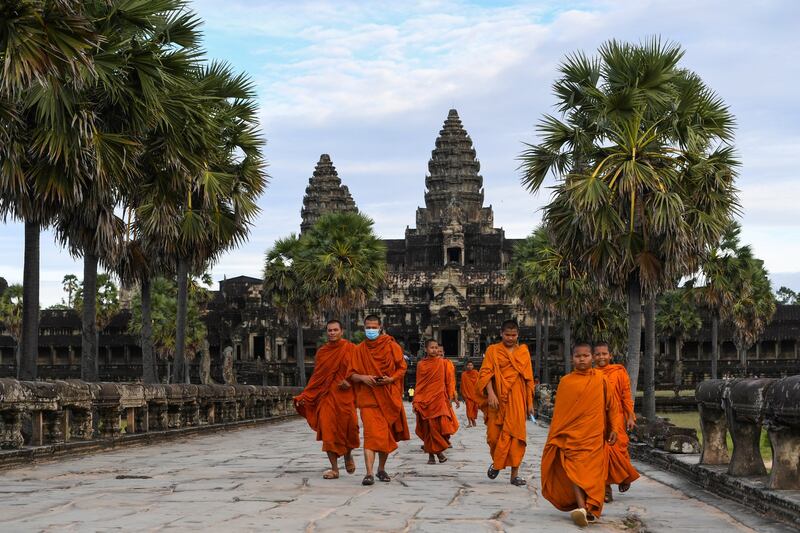A youth group demanding that Cambodia’s government tackle major causes of economic hardship with payments to the millions left jobless as a result of the coronavirus pandemic on Wednesday called off plans to petition Prime Minister Hun Sen after municipal authorities denied it permission to rally.
On Tuesday, the Women for Society Association sent a request to City Hall in the capital Phnom Penh to lead a march Friday of 200 participants to Hun Sen’s cabinet office, where the group planned to call for government assistance on rent, debt, utility bills, and the cost of gasoline amid Cambodia’s latest outbreak after a year-long economic shutdown of the economy.
However, the request was rebuffed, and the group said it would honor the local government’s order.
Cambodia marked its first official death from COVID-19 on March 11, a year to the day that the World Health Organization (WHO) labeled the coronavirus a global pandemic. Since then, five people have died as a result of the disease caused by the virus and restrictions aimed at stopping the spread of the outbreak have decimated the impoverished country’s economy.
Speaking to RFA’s Khmer Service on Wednesday, Women for Society Association President Keo Tithlida said that while her group no longer plans to lead a march of supporters to Hun Sen’s cabinet office, she plans to petition the prime minister herself.
“City Hall said if we proceed with the march, we will be opposing the law,” she said.
“We are not in opposition to the municipal authorities … I am willing to go alone, as long as the petition reaches the [central] government.”
While Cambodia has remained relatively unscathed by the virus, it reported a daily record last week of 105 new COVID-19 cases, bringing the country’s total number of infections to 1,430—nearly triple that of a month ago when the latest outbreak was first detected. By Wednesday, the number of infections had climbed to 1,817.
Independent Democracy of Informal Economy Association (IDEA) President Vorn Pov told RFA that the government needs to do more to help those in need, echoing several of the Women for Society Association’s demands.
“The government should consider providing people daily sustenance, stimulus checks like neighboring countries, free utilities, and intervene in loan debts,” he said.
Driven to scavenging
Phnom Penh’s refusal to allow the Women for Society Association to march later this week came as representatives of around 100 scavengers who rely on what they can pick out of the city’s dumpsters told RFA that their hardships have become even more pronounced due to coronavirus restrictions.
One scavenger named Bun Mann said that quarantine rules have prevented her children, who recently returned to Cambodia from neighboring Thailand where they labored as migrant workers, from seeking employment back home.
“It is very difficult to earn a living during the coronavirus,” she said, adding that she has been forced to take on extra work to support her family.
A taxi driver in Siem Reap named Kim Nai told RFA that he had been out of work for a year because no tourists are coming to the area to visit Angkor Wat.
He said he had been forced to scavenge, picking up snails and crabs from local rice fields to buy food.
“It’s been very quiet, with no tourists,” he said. “Before the coronavirus, I could barely make enough, but now it is even worse. I have no steady income.”
Kim Nai said that if he is lucky, he can earn between 5,000 and 10,000 riel (U.S. $1.25 and $2.50) a day, although he often does not have enough rice to eat because he can’t find enough to scavenge.

Sector hard hit
Another taxi driver in Siem Reap named Pok Tho said the decline in tourists also caused him to give up driving. Instead, he said, he now raises chickens and ducks to earn a living.
“As someone who relies on tourists, I’ve been left with no income,” he said.
“To be honest, if I have enough food in the morning, I won’t have enough in the evening.”
Pok Tho said he hopes to find a job in construction but has yet to do so.
According to the Phnom Penh Post, Cambodia Association of Travel Agents (CATA) president Chhay Sivlin said Tuesday that the prolonged pandemic had devastated Cambodia's tourism industry, warranting government support.
Cambodia’s Ministry of Tourism has said that from January to March last year, Cambodia hosted 1.16 million international tourists, a decrease of 38 percent over the same period a year earlier. In the second quarter of 2020, the number of tourists had dropped by 90 percent.
Angkor Enterprise, the agency that sells tickets to the Angkor Wat complex, said that slightly more than 400,000 people visited the site over the past two months—a decline of 99 percent from a year ago.
Hotel manager Eang Chhal told RFA that around 200 five-star hotels had been forced to close their doors during the pandemic, while several other tourism-related businesses had also been shuttered, but the cost of meat and vegetables is up.
Ministry of Tourism recently announced that it will waive fines for tourist businesses that have yet to apply for licenses until the end of the year, after around 30 percent filed for closure or suspension of operations.
Reported by RFA’s Khmer Service. Translated by Samean Yun. Written in English by Joshua Lipes.
